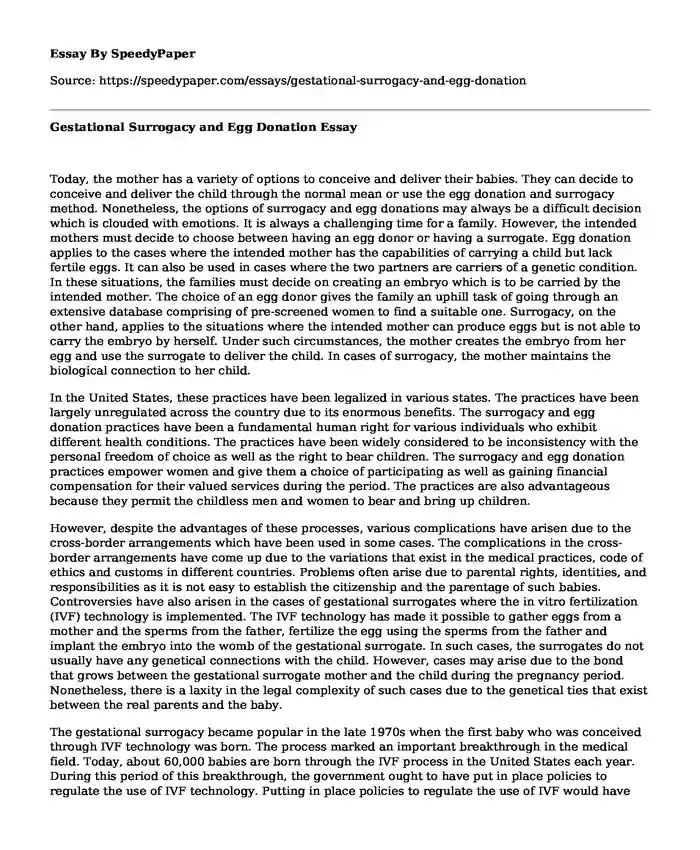
| Type of paper: | Course work |
| Categories: | Leadership analysis Culture United States Government Career |
| Pages: | 4 |
| Wordcount: | 832 words |
Today, the mother has a variety of options to conceive and deliver their babies. They can decide to conceive and deliver the child through the normal mean or use the egg donation and surrogacy method. Nonetheless, the options of surrogacy and egg donations may always be a difficult decision which is clouded with emotions. It is always a challenging time for a family. However, the intended mothers must decide to choose between having an egg donor or having a surrogate. Egg donation applies to the cases where the intended mother has the capabilities of carrying a child but lack fertile eggs. It can also be used in cases where the two partners are carriers of a genetic condition. In these situations, the families must decide on creating an embryo which is to be carried by the intended mother. The choice of an egg donor gives the family an uphill task of going through an extensive database comprising of pre-screened women to find a suitable one. Surrogacy, on the other hand, applies to the situations where the intended mother can produce eggs but is not able to carry the embryo by herself. Under such circumstances, the mother creates the embryo from her egg and use the surrogate to deliver the child. In cases of surrogacy, the mother maintains the biological connection to her child.
In the United States, these practices have been legalized in various states. The practices have been largely unregulated across the country due to its enormous benefits. The surrogacy and egg donation practices have been a fundamental human right for various individuals who exhibit different health conditions. The practices have been widely considered to be inconsistency with the personal freedom of choice as well as the right to bear children. The surrogacy and egg donation practices empower women and give them a choice of participating as well as gaining financial compensation for their valued services during the period. The practices are also advantageous because they permit the childless men and women to bear and bring up children.
However, despite the advantages of these processes, various complications have arisen due to the cross-border arrangements which have been used in some cases. The complications in the cross-border arrangements have come up due to the variations that exist in the medical practices, code of ethics and customs in different countries. Problems often arise due to parental rights, identities, and responsibilities as it is not easy to establish the citizenship and the parentage of such babies. Controversies have also arisen in the cases of gestational surrogates where the in vitro fertilization (IVF) technology is implemented. The IVF technology has made it possible to gather eggs from a mother and the sperms from the father, fertilize the egg using the sperms from the father and implant the embryo into the womb of the gestational surrogate. In such cases, the surrogates do not usually have any genetical connections with the child. However, cases may arise due to the bond that grows between the gestational surrogate mother and the child during the pregnancy period. Nonetheless, there is a laxity in the legal complexity of such cases due to the genetical ties that exist between the real parents and the baby.
The gestational surrogacy became popular in the late 1970s when the first baby who was conceived through IVF technology was born. The process marked an important breakthrough in the medical field. Today, about 60,000 babies are born through the IVF process in the United States each year. During this period of this breakthrough, the government ought to have put in place policies to regulate the use of IVF technology. Putting in place policies to regulate the use of IVF would have brought about discipline and would have helped to curb the current state of lack of regulation that witnessed today across the United States.
However, today, the technology has been widely utilized across the world making it next to impossible to calculate the exact number of deliveries. The key concern that has been put across is the ethics of the process as well as the payment of the surrogate mothers and the egg donors. There is a larger outcry that the eggs ought not to be purchased or sold as commodities as they are the basic units of human beings. The oocyte donation ought to be proper regulatory structures that illegalize the egg donation compensation on the monitory basis. The mode of compensation for egg donation ought not to be in monitory value but need to be in the form of other reproductive services. Also, due to the legal matters that often arise due to the identities of the child, there ought to be clear laws that control the gestational surrogacy and egg donations within the country. The laws concerning the stillbirths are also not clear. Due to the risk undergone by the surrogate mothers during the pregnancy periods, the genetical parents need to cater for every medical expense of these mothers to ensure they deliver healthy babies.
Cite this page
Gestational Surrogacy and Egg Donation. (2023, Jan 10). Retrieved from https://speedypaper.com/essays/gestational-surrogacy-and-egg-donation
Request Removal
If you are the original author of this essay and no longer wish to have it published on the SpeedyPaper website, please click below to request its removal:
- Free Essay on the Book: Review of The Price of Inequality by Joseph Stiglitz
- Free Essay Example: Audience Analysis
- Essay Sample with the Poem Analysis
- Free Essay Example on Birth Rates in Japan
- Free Paper on the Report on the Actions of Penn State Related to the Child Sexual Abuse
- Is Hunting Necessary? Get the Answer in the Essay Sample
- Nissan Company Essay Sample
Popular categories




